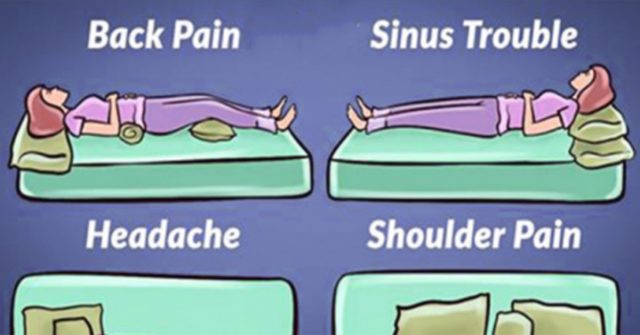One of the most important aspects when it comes to our overall health is our quality of sleep. A human being, on average, sleeps for around 25 years of their life, based on getting 8 hours of sleep each night. Getting a good night’s sleep is crucial to many aspects of our health, and it’s important to make sure you’re comfortable and enjoying how you’ll be spending roughly one-third of your entire life.
The position we sleep in can affect our quality of sleep, and it can also affect certain health conditions. Sleeping in the position best suited for your body can improve your quality of sleep and also your overall health. If you have trouble sleeping or have any of the following health issues, try a few of these sleeping positions and see if it helps you get a good night’s rest.
The Best Sleeping Position For Each Of These Health Conditions
The position we sleep in can affect different aspects of the body, such as blood pressure, the sinuses and many others. To help your body heal and recover, try the following sleeping positions and take care of how you sleep, not just how much you sleep.
1. Heartburn
Nighttime heartburn affects four out of five people who suffer from regular heartburn and acid reflux. The discomfort and bitter taste can make sleep uncomfortable, and a challenge.
A study conducted by the Graduate Hospital in Philadelphia found that sleeping on your left side can prevent heartburn at night. The same study found that sleeping on your right side can increase the discomfort caused by heartburn.
Sleep on your left side. This position seems to help reduce nighttime heartburn symptoms, says David A. Johnson, MD, internal medicine division chief at Eastern Virginia School of Medicine, Norfolk, Va. Also try to elevate your upper body a little bit. When you lay flat in bed, your throat and stomach are basically at the same level, making it easy for stomach acid to flow up into the esophagus, causing heartburn. Elevate the upper body by either putting the head-side of the bed on 4-6 inch blocks, or sleeping on a wedge shaped pillow that elevates your upper body, not just your head.
2. Digestion Trouble
Sleeping on the left side allows gravity to help waste from digested food to move more easily from the small intestine into the large intestine through the ileocecal valve (ICV).
As the night goes on and one continues sleeping on the left side, the waste moves more easily into the descending colon. With the help of gravity and a good night’s sleep on the left side, the descending colon is full of waste and is ready to easily and completely be emptied in the morning.
3. Neck Pain
These two sleeping positions are easiest on the neck and can help prevent neck pain: on your side or on your back. If you prefer to sleep on your back, choose a rounded pillow to support the natural curve of your neck, with a flatter pillow cushioning your head. You can easily do this by tucking a small neck roll into the pillowcase of a flatter, softer pillow. You can also use a special pillow or memory foam that has built-in neck support with an indentation for the head to rest in.
4. Menstrual Pain
Dr Lisa Mindley, MD, advises that “sleeping in the fetal position takes pressure off the abdominal muscles,” as it causes the “the skeletal muscles around your abdomen” to relax. In short, the less strain there is on the abdomen, the less pain and cramping a person experiences. Jennifer Wider, M.D., agrees stating that, “many women report that the fetal position can help relieve cramps.”
To achieve the fetal position, try sleeping on your left side, tucking the knees towards the chest and placing a pillow between the legs for comfort, and slightly curve the spine forward, and bow the head down a little.
5. High Blood Pressure
Before trying sleeping positions to help with high blood pressure, it’s always recommended to first consult your doctor to learn about your specific condition and possible solutions.
Researcher Yasuharu Tabara of Ehime University School of Medicine in Ehime, Japan, notes that high nighttime blood pressure is a bad sign for people with heart problems. He wondered whether sleeping posture might affect one’s overnight blood pressure, and carried out a study that had interesting results.
Tabara and colleagues signed up 271 healthy men not taking blood pressure medication. They ranged in age from 19 to 64, with an average age of 50. The researchers put automatic blood-pressure cuffs on the men and asked them to lie face up. Then they had them turn over and lie face down while they again measured the men’s blood pressure. The men’s overall blood pressure went down slightly, but went down significantly when the men rested face down. Twenty-five of the men had a dramatic decrease in blood pressure; more than 15 points when they flipped from face up to face down.
While further studies are needed to verify, sleeping in the face down position may help to reduce high blood pressure.
6. Sinus Troubles
When it comes to sinus issues, sinus pressure and sinus infections, the way you sleep can play an important role. “There are many reasons that sinus pain and congestion get worse at night,” says Jordan S. Josephson, MD, an ear, nose, and throat specialist at Lenox Hill Hospital in New York City and the author of Sinus Relief Now. “One is that allergies tend to be worse at night, and two is that when you lie down, your nose becomes more congested.”
“For congestion relief, sleep with your head elevated on a few pillows and maintain a position where your head is above your heart,” Dr. Govindaraj, an associate professor of otolaryngology and neurosurgery at Mount Sinai Hospital in New York City suggests. “This will decrease blood flow pooling in the nose.” Lying flat, by contrast, allows mucus to build up in your sinuses, where it can clog the nasal passages and disrupt sleep. Harvard Medical School also recommends that those with sinus issues should try sleeping with an elevated head to stop the mucus from pooling in the sinuses.
7. Headaches
Sleeping in the side position, as compared to on one’s back or stomach, may more effectively remove brain waste as studies have shown, and proves to be an important practice to help reduce the chances of developing Alzheimer’s and other neurological diseases as well.
Tooth-grinding can also leave one waking up to a morning headache, and using the right pillow plays an important role in reducing headaches. Tension headaches happen when the neck and scalp muscles are strained, especially if they’re held in the same position for a long time while sleeping. Choose a pillow that keeps the head and neck in a neutral position, similar to when standing.
8. Back Pain
For lower back pain, try sleeping on your side with a pillow between your knees: allow the right or left shoulder to make contact with the mattress, as well as the rest of the side of the body, place a pillow between the knees, and if there’s a gap between the waist and the mattress, consider adding a small pillow there for added support.
You can also help alleviate back pain by sleeping on your back and placing a pillow under the knees and a rolled-up towel under the curve of your back if this feels comfortable for you. There are many different causes of back pain, so it’s important to find a position that feels good with your specific condition.
See Also: The Kind Of Woman You Are According To Your Sleeping Position
9. Shoulder Pain
It is first recommended to always not sleep on the side of the shoulder pain. Sleeping on the opposite shoulder side can yield the best results, as experts often advise both against sleeping on the back and on the stomach when dealing with shoulder pain, as it can pull and stretch the shoulders out of alignment.
To help find a comfortable sleeping position, consider using body pillows to keep your body relaxed and supported while sleeping on the side opposite of the shoulder pain.
That’s it.
Have any of these sleeping positions helped you to alleviate any health issues?
Let us know in the comments.
Whatever sleeping condition you’re working towards solving, we hope you find peace and relief and can get a good night’s sleep tonight.
You are loved.


















